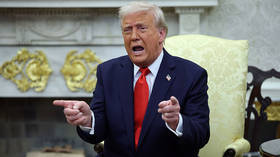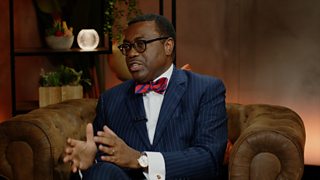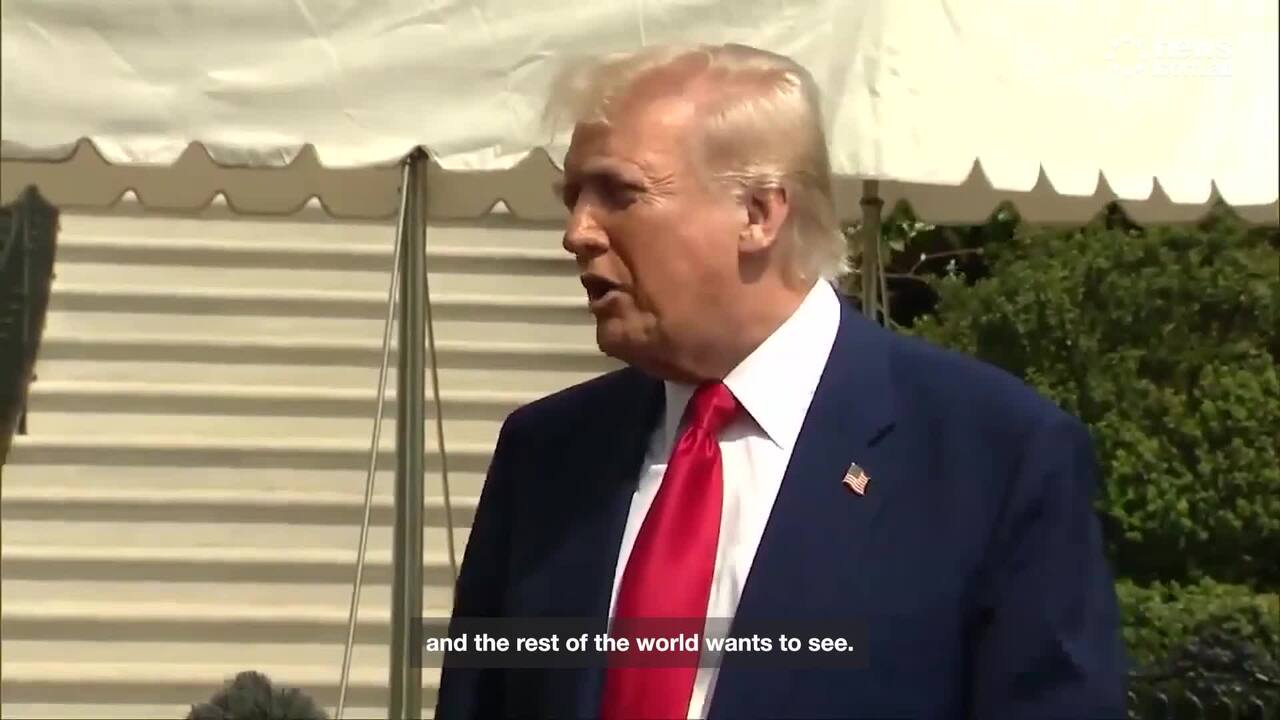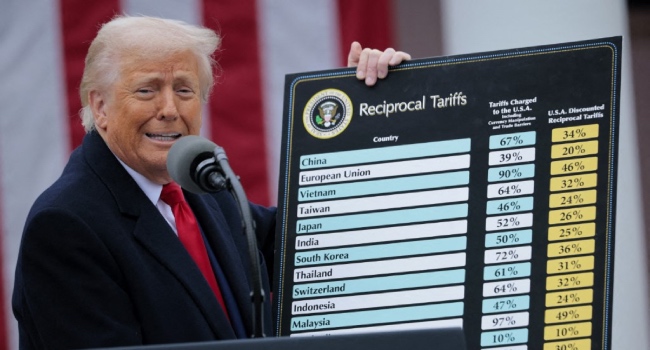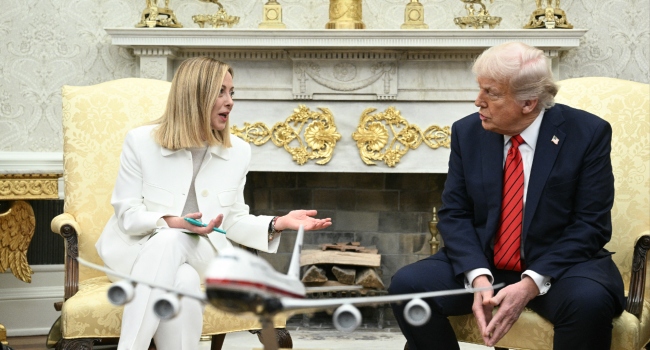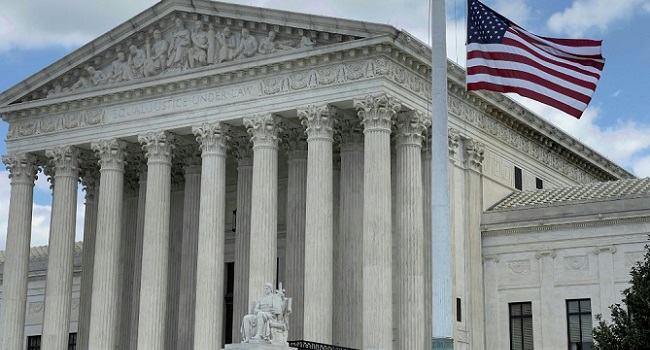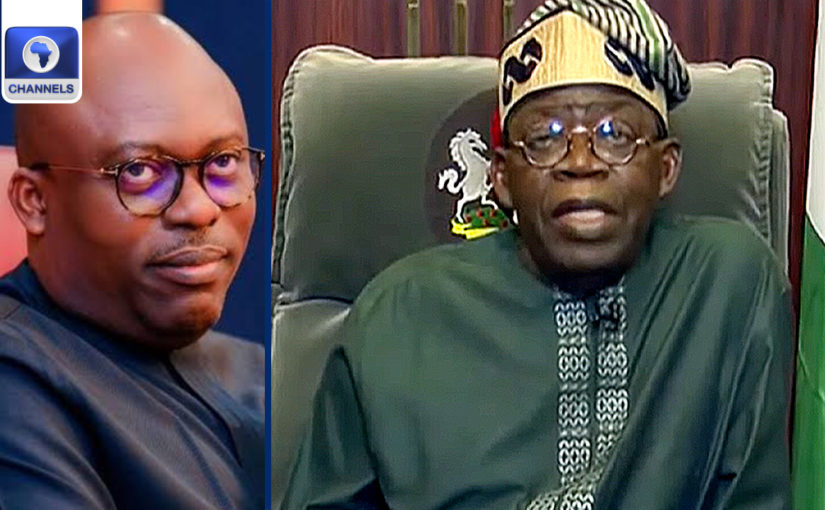German state media shows Nazi insignia in Ukrainian boot camp for kids | Russia-Ukraine conflict
Putin confirms end of Easter truce
4 Apr, 2025 18:33
US sanctions against Russia are unprecedented – here’s why there’s no effort to end them
By hitting Moscow with never-before-seen economic warfare, the West has helped it thrive

@tarikcyrilamartarikcyrilamar.substack.comtarikcyrilamar.com
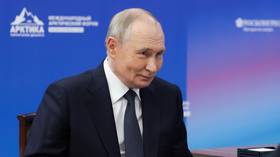
Russian President Vladimir Putin. © Sputnik/Gavriil Grigorov
Another Trump-Quake has been shaking the world. In his attempt to, in essence, make America great again by eliminating its trade deficits and re-industrializing it into, in his own words, “an entirely different country,” US President Donald Trump has launched a global tariff campaign that has shocked the world by being even fiercer than expected.
Its details are convoluted – involving almost scholastic debates on the meaning of the term “reciprocal” as well as bizarre math to calculate the tariffs – and its impact is uneven, but its core is simple: The US is greatly, often massively increasing tariffs on imports from almost every other country in the world. It is thereby disrupting the international economic order as it currently exists, making a harsh contribution to wrenching it from moribund globalization into an emerging age of protectionism and geopolitically redirected trade flows.
In practical terms, if Trump’s policy is implemented as announced, the average duty that importers will have to pay – rising from an estimated 2.5 percent to 25 percent – will be higher than ever before since World War I. Individual examples of massive new additional tariffs include China (34 percent), India (27 percent), and the European Union (20 percent).
All of the above means that Washington has imposed tariffs even higher than during the extremely tense and dismal period between the Great Depression and World War Two. As the chief economist of a major bank has laconically remarked, the 1930s are back. Welcome to your future: it could well be a second-hand nightmare from a very dark past.
The immediate consequences of the great tariff coup have been dramatic: Trump announced his new tariffs on Wednesday, April 2. US “stocks, oil and the dollar tumbled” immediately, including flagship companies, such as Apple, Amazon, Meta, and Nike. On the whole, US markets took their worst hit since 2020. Literally trillions were wiped out almost faster than you can turn your MAGA cap around.
Trump’s tariffs will turn EU economy into ‘decaying corpse’ – Medvedev
Of course, the downturn also spread around the world, reflected by stock markets in Canada, Germany, Japan, the UK, and China (though less so there than elsewhere). And this at a time when US macroeconomic data was better than for many other Western countries.
Mainstream politicians, journalists, experts, bankers, and business people have been casting about for words to express their confusion, fear, and frustration: “economic ignorance” and “nonsense” (Washington Post), “havoc” (The Economist), “max pessimism” (New York Times). And even if you include the marginalized voices of those siding with Trump, everyone agrees that something momentous has happened, from arch conservative German newspaper Die Welt – a new “economic era” – to anything but conventional Russian philosopher Aleksandr Dugin. A firm believer in a “Trump Revolution” – likely to be badly disappointed – he finds the tariff push “ethically marvelous and morally exceptional.”
None of the above is criticism (although I’d have plenty of that, too, for Trump and his team: for instance, that they are already matching former sort-of-president Joe Biden in corruption and violence by co-perpetrating the Israeli genocide of the Palestinians). But there, Washington is, of course, just part of an even larger failure: As acute observers have noted, the West is now divided over tariffs and united in supporting genocide.
Yet is it really the whole world that’s shaking in the big Trump Tariff Quake? No, not quite, and the exceptions are telling: Russia, as well as Belarus, Cuba, and North Korea. That makes Russia the one and only top league player that the Trumpists have exempted from their tariff attack, even if Moscow is nonetheless monitoring its international impact and preparing to minimize the indirect effects.
The official American reason for this exception is that due to the massive Western sanctions already in place against Moscow, it would be silly to levy fresh tariffs on the itsy-bitsy teeny bit of imports from Russia that is left. In the words of White House press secretary Karoline Leavitt, the current sanctions already “preclude any meaningful trade.” Dmitry Peskov, spokesman for the Russian presidency, agreed. There simply is no “tangible” trade to go after at this point.
True enough, makes sense. But only as far as it goes, and that’s not far at all. In reality, there is a much more interesting story here. But to notice it, we must zoom out. Once we do so, the case of Russia becomes extraordinarily instructive.
White House explains Russia’s absence from tariff list
Consider that Trump’s new offensive amounts to, in effect, a form of economic warfare, whether one-sided or not. Independent of, that is, whether other countries retaliate – as China has already started doing and as more will soon – or hold still out of fear that any resistance will make America’s aggression even worse, as US treasury secretary Scott Bessent is threatening in true mobster style. The boss has just shattered your kneecap with a carpenter’s hammer and that may feel bad, but don’t make him really angry by trying to fight back, or he’ll put your head in a vice next.
Yet Russia has already faced the single most extensive, obstinate, and ferocious economic warfare attack carried out by states not officially at war in modern history, and not merely from the US but the collective West as a whole.
As Russian President Vladimir Putin recently told a meeting of the Russian Union of Industrialists and Entrepreneurs in an important speech sorely under-reported in Western mainstream media, there are now “28,595 sanctions against individuals and legal entities.” That is a number significantly exceeding “all sanctions ever imposed on all other nations combined.” Even a CNN journalist acknowledged in a recent interview with Kirill Dmitriev, the head of Russia’s Direct Investment Fund, that the scale of the sanctions deployed against Russia has “no precedent.”
And yet Russia has survived this assault, explicitly aimed at its economic devastation, political disintegration, and geopolitical degradation. Instead of crumbling under the weight of what Putin has acknowledged – with certainly deliberate understatement – as “serious challenges,” Russia has done well in a way that has surprised many international observers and disappointed its enemies in the West.
Indeed, to take only one indicator, in 2024 Russia had one of the most dynamically growing economies in the G20. This outcome was produced by both Russian businesses and the state. The latter has applied a whole set of instruments including capital controls, expanded spending, deliberate import substitution, and policies of reorienting trade. In combination with the effect of the sanctions themselves, their result has been what one analyst has called a “seismic new shift in global trade flows,” much of it in Russia’s favor.
Moscow’s systematic response to this challenge has played a key role in bringing about this outcome. Take one comparatively small example: a recent conversation between Putin and the head of the Russian Export Center (REC), Veronika Nikishina. The REC is a government agency that promotes Russian non-commodity exports. Consider that it was established in 2015 and that 2014 was the year in which the Ukraine crisis escalated with a Western regime change operation in Kiev, as well as sanctions intended to punish Russia for resisting massive Western overreach.
Kremlin comments on envoy’s Washington talks
It is obvious, then, that the REC is one reflection of a strategic policy choice that some Western observers still underestimate. Moscow’s reaction to the West’s massive and constantly escalating economic-warfare attack has not been to rely solely on finding ways to get its raw materials and commodities to international markets and buyers. Instead, there has been a deliberate emphasis on strengthening non-commodities. Indeed, in 2018, a key presidential decree on national priority targets included the “creation […] of a high-productivity export-oriented sector.” Now, Nikishina is reporting that 85 percent of Russia’s non-commodity exports are flowing to “friendly countries.”
Russia’s resilience was the message that Dmitriev had for CNN’s audience, too. Asked if Moscow is, in essence, asking for a reduction of sanctions in the ongoing normalization talks with the Trump administration, the head of Russia’s foreign direct investment agency said “absolutely not.” Let that sink in. Likewise, the spokesman for the Russian presidency, Dmitry Peskov, is on record stating that the issue of sanctions will not interfere with negotiations with Washington.
It is true that negotiations among adults are complex and confidential processes, and not everything needs to be shared with the public. It is also true that Moscow has an interest in displaying indifference to sanctions, especially because Washington cannot drop the bad habit of occasionally threatening even more of them. Finally, it is very hard to see why Moscow would not welcome a lifting of sanctions if it were to happen on terms it finds acceptable and useful – for Russia, that is.
But the key point is Moscow’s messaging that it cannot be blackmailed, neither by imposing nor by lifting sanctions. During the same speech before the Russian Union of Industrialists and Entrepreneurs mentioned above, Putin sketched Moscow’s current position. And it is anything but naïve, soft, or pliant.
“Sanctions,” Putin reminded his audience of entrepreneurs, “are neither temporary nor targeted measures.” Instead, “they constitute a mechanism of systemic, strategic pressure against our nation. Regardless of global developments or shifts in the international order, our competitors will perpetually seek to constrain Russia and diminish its economic and technological capacities.” In other words: Don’t kid yourself, Western sanctions will not simply go away, even if the Ukraine War ends.
Even worse, they might well keep escalating, because, according to Putin, now “the so-called Western elites […] routinely threaten Russia with new sanctions” and churn out whole new packages of them incessantly.
Why is BRICS+ suddenly running everything?
Note that Putin issued this warning against exuberant expectations a month after the Russia-US talks in Riyadh, that is well after the process of negotiating a normalization of relationships with Washington had begun in public. Clearly, the Russian leadership sees no reason why better or at least more rational relationships with the US should require pleading for sanctions relief. Indeed, the opposite is true. Moscow is ready to explore and pursue this normalization policy, while remaining resolutely realistic about what to expect with regard to Western economic warfare.
And there you have it. For years before Trump 2.0 started the new tariff crusade that is now frightening everyone, one of the world’s most important countries has proven that even much worse economic warfare can be withstood. It can even become, again in Putin’s words, a “catalyst of positive structural changes” in an “economy, including in the financial [and] technological spheres [as well as] in many other key areas.”
Trump’s newest assault on the world, in other words, is deeply ironic. While the American president strives to, in essence, initiate a policy of rebuilding America’s real – industrial and manufacturing – economy, his rude ruin-thy-neighbor methods are likely to speed up the process in which other countries’ economies learn to detach from the US and to rely more on each other.
Whatever happens inside the US, Trump’s own undercutting of America’s position in the international system of trade, supply chains, and – against his expectations – even investment and finance, will also be a catalyst of a world of both political multipolarity and distinct economic zones, if not blocs. And that, in turn, may well be a necessary stage in burying Western predominance for good.
These are long-term, post-Cold War processes that did not start with Trump. Their root cause is the decline of the US, which he is trying to stop so desperately and crudely, and the rise of other, non-Western powers. Trump’s tariff policy is certain to be bad for what is left of “globalization,” the economic equivalent of the infamous “rules-based order,” that is, of always stacking the deck in favor of Western power and profits. But that is precisely why it may end up favoring the globe, that is, all – or, at least, the vast majority – of humanity.
